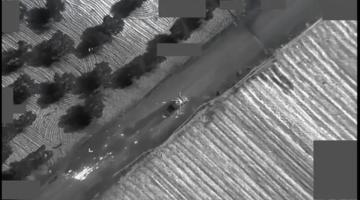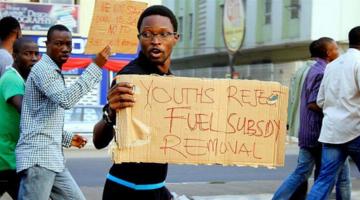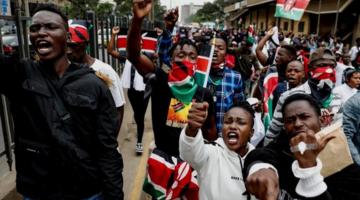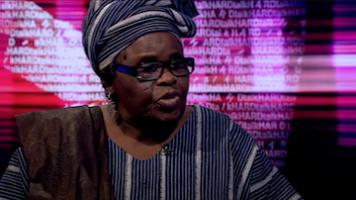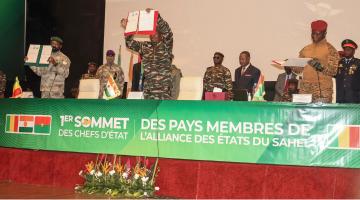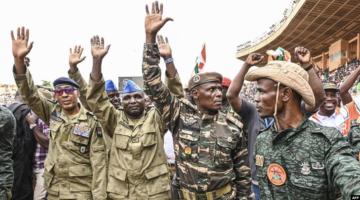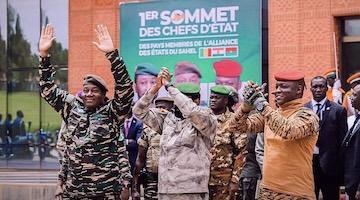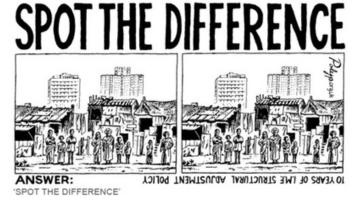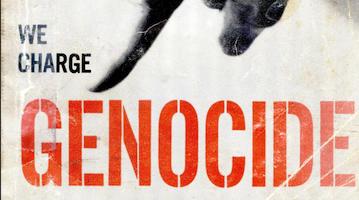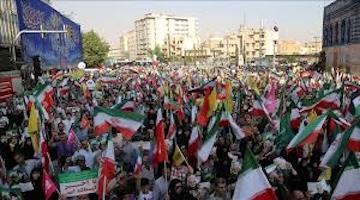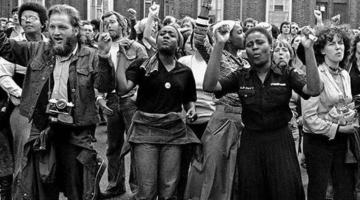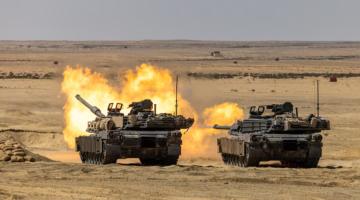Newly elected President Bola Tinubu, the Chair of ECOWAS, has mounting political problems while advocating military intervention in neighboring Niger.
Originally published in Fighting Words.
Nigeria is Africa’s most populous state and is listed as having the largest economy on the continent with huge deposits of oil, natural gas and other strategic resources.
In possession of these material assets along with the 223 million people that inhabit the West African state, the achievements of Nigeria should be limitless.
However, the system of neo-colonialism in Africa, where the national wealth of various states largely benefits imperialism, is still maintaining a dominant position over the labor and resources of the people. This system of exploitation constitutes the major impediment to genuine sovereignty, economic independence and social emancipation. The Federal Republic of Nigeria represents a case in point for the burgeoning struggle to eradicate neo-colonial rule.
Trade Unions Demand Economic Relief
In recent weeks the two main trade union federations in Nigeria, the Trade Union Congress (TUC) and the Nigerian Labor Congress (NLC), have given voice to the suffering of the workers and impoverished majority within the country. Both the TUC and NLC, among others, are demanding sweeping economic programs to ameliorate the decline in real wages due to the elimination of fuel subsidies and the imposition of higher taxes on consumer goods.
These measures were enacted by President Bola Tinubu in the immediate aftermath of his ascendancy to political office. In addition to raising the prices on petroleum by discarding subsidies which kept the cost of fuel down, the president declared a food emergency inside the country. Although Tinubu stated that the money which will remain with the federal government by no longer subsidizing fuel would be invested in agricultural production to reduce the importation of foodstuffs. Despite this stated objective, it will take considerable time to implement higher yields for crops and livestock production.
The NLC and TUC had already threatened to strike just weeks prior to the September 6 and 7 work stoppages. The nationwide industrial action was labeled a “warning strike” indicating that if the issues of importance to labor were not addressed, the workers were prepared to call an indefinite general strike.
There were differences between the TUC and NLC over the “warning strike.” The NLC ordered their members to return to work on September 8, saying that the struggle was by no means over. During the two-day strike, the NLC rejected a meeting with the Minister of Labor and instead insisted upon emergency measures to address the deteriorating social conditions prevailing among the Nigerian working class. The TUC federation discouraged their members from participating in the two-day work stoppage and encouraged further dialogue with the Tinubu administration.
NLC President Joe Ajaero issued a press statement on September 7 at the conclusion of the “warning strike” saying that:
“As we mark the end of the two-day nationwide warning strike today, at the stroke of midnight, we earnestly call upon you all to gracefully conclude the strike and return to work tomorrow in accordance with our initial agreement. We would like to take this moment to express our profound appreciation for your unwavering determination and dedication, which played a pivotal role in the resounding success of this action. Your contributions during this warning strike exemplify your unwavering commitment to our shared cause. In the event that the government fails to provide the appropriate responses to our demands, we encourage you to maintain your steadfast resolve. The same passion and determination that fueled this warning strike will be crucial if we find ourselves compelled to embark on an indefinite nationwide strike. Congress is not unmindful of the actions of detractors and fifth columnists but in the face of them all, we remain undaunted and more committed to the defense of Nigerian workers and people at any given time. Our nation deserves better.”
Tinubu Administration Ask Nigerians to Pray for Stability
President Tinubu and his Minister of Defense Mohammed Badaru asked the people of Nigeria to pray for peace and stability. Nonetheless, the failure of the new administration to carry out policies which support the working class has become a major source of instability.
Following the lead of the World Bank, the International Monetary Fund (IMF) and international rating agencies, the president is attempting to make the country more attractive for foreign direct investment. Even though Nigeria is one of the largest producers of oil in Africa, the lack of domestic investment in improving infrastructure has resulted in the closure of oil refineries and shortages of fuel.
Many motorists have either reduced usage or abandoned their vehicles due to the high cost of fuel. Filling stations are closing because there is not enough foreign exchange to pay for the transport of fuel from the ports to the urban areas such as the commercial capital of Lagos.
After his first 100 days in office, the living standards of millions of Nigerians have declined significantly. It is estimated that another 7.1 million people have fallen into poverty due to the neoliberal policies of the Tinubu administration.
The Nigerian Guardian newspaper wrote on the drastic decline in the value of the national currency, the naira:
“Within days, the naira, which was trading at an average of N463/$ at the official market fell to over N700 to a dollar while the black-market rate is currently over 900/$. The sharp rise in the exchange rate, alongside high energy costs, has caused a ripple effect in the goods market. Year-to-date, the currency now ranks the worst performing in Africa after suffering a hair shave of about 40 per cent against the dollar. In response to the changes made by Tinubu, in June 2023, the headline inflation rose to 22.79 per cent relative to May 2023 headline inflation rate which was 22.41 per cent. Despite a declaration of a state of emergency on prices of food by the President, in July, the headline inflation rate rose further to 24.08 per cent.”
Tinubu left Nigeria on September 7 to attend the G20 Summit in New Delhi, India. Prior to his departure, the president held a meeting with the heads of the military and other security services.
According to the Nigerian Tribune publication:
“Ahead of his departure for India to attend the G20 Summit, President Bola Tinubu met on Monday (Sept. 4) with the service chiefs and other heads of security agencies. The meeting at the presidential villa in Abuja was attended by the Chief of Defense Staff, General Christopher Musa; the Chief of Army Staff, Lieutenant General Taoreed Lagbaja; his Navy counterpart, Admiral Emmanuel Ogalla; and the Chief of Air Staff, Air Marshal Hassan Abubakar. Also in attendance at the closed-door meeting were some ministers, including that of defense, Abubakar Badaru. The security heads were said to have used the opportunity to brief the president on the current security situation in the country.”
Considering the recent wave of military coups in West Africa, the situation has taken on an ominous character. There are already major security issues impacting the country with the rebel insurgencies in the northeast and the southeast of Nigeria. Other problems such as kidnappings for ransom and the clashes between communities over access to agricultural lands and livestock have been widespread in the north and central regions of the country.
Tinubu’s election earlier in the year has been disputed by the two leading opposition parties, the People’s Democratic Party (PDP) and the Labor Party (LP). An elections tribunal upheld the purported victory of Tinubu and the APC in early September. However, the two parties are pledging to take their case to the Nigerian Supreme Court for redress.
Domestic Crisis and Imperialist-instigated Threats of Military Intervention in Niger
Sharing a northern border with Niger where a military coup took place on July 26, provided an opportunity for the United States and France to encourage pro-western governments in the Economic Community of West African States (ECOWAS) such as Nigeria to stage an invasion aimed at restoring ousted President Mohamed Bazoum to office. Nevertheless, there has been broad opposition to such an adventurous plot.
Tinubu’s own political party, the All-Progressives Congress (APC) that controls the Nigerian Senate, refused to endorse a western-backed invasion into Niger. There have been many voices in Nigeria and across the region speaking out against an ECOWAS intervention.
Niger is a major base for military and intelligence operations for Washington and Paris. The presence of two Pentagon bases of the U.S. Africa Command (AFRICOM) where 1,100 troops are stationed are essential for the continued dominance of imperialism in West Africa. France, which is under pressure to completely vacate Mali, Burkina Faso and Niger, has 1,800 troops in Niamey and its environs and views the recent coup as a serious threat to its military forces and the uranium deposits which are largely controlled by Paris.
A combination of internal and external dynamics has pushed the Tinubu administration in a direction which is detrimental to the future of the Nigerian people and its neighbors. The recent strikes by the trade union federations provide a possible framework for achieving qualitative social change. A coalition of workers, youth and democratic forces committed to revolutionary change represents the only hope for transforming Nigeria into its rightful place of leadership within a renewed and conscious African continent.
Abayomi Azikiwe is the Editor of Pan-African News Wire.

